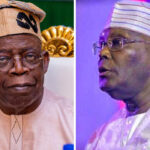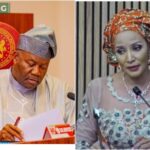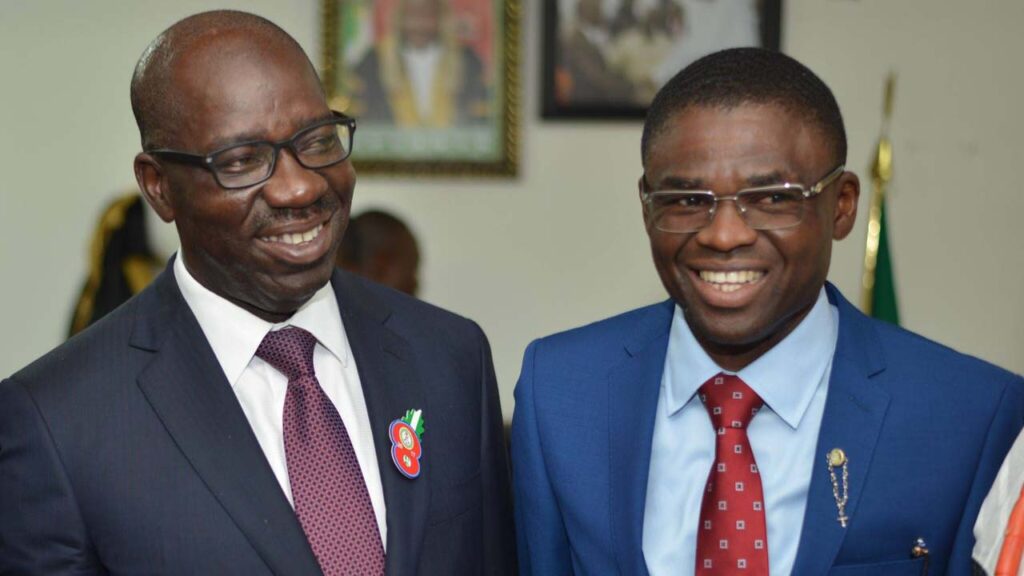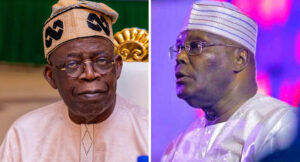Shaibu is going into the race, determined to confront his principal and Governor of the state, Godwin Obaseki, who is not in support of his ambition. He alluded to his political travails in the last couple of months, especially, and declared that he remained unbowed, even as he forged ahead against Obaseki’s unfavourable disposition.
The signs of what will come in the state emerged when Shaibu’s public declaration, which was earlier scheduled to take place at Eterno Hotels in Government Reserved Area (GRA), Benin City, was shifted late Sunday night when information filtered in that one of the Governor Obaseki’s support groups, “Obaseki Ending Well,” also scheduled an event at the same venue on Monday.
The development forced Shaibu to look for an alternative venue and he chose the sacred ground of a Catholic Church in Benin City, the state capital.
Addressing his supporters at the Bishop Kelly Pastoral Central, the new venue, Shaibu said that despite his predicament, his antecedents in the struggle for democracy were part of the propelling factors for him to move on to actualise his ambition.
Describing himself as a “100 percent Home Boy”, an allusion to the clamour that the next governor of the state must be someone who knows the state very well, and not someone ‘imported’, a veiled reference to the touted candidate of Governor Obaseki, Asue Ighodalo,
Opposition to Ighodalo has been fueled by claims that he is unknown in Edo State, a narrative that Shaibu has since advanced by declaring himself the homeboy who does not need to learn the ropes of governance, being familiar with the nook and cranny of the state.
Shaibu hinged his campaign on five pillars: Infrastructural development, economic diversification, education and sports.
Others are skills development and job creation, healthcare, social welfare system, agriculture, rural development, poverty alleviation, environmental sustainability, and transparent governance.
He said that while working closely with Obaseki in the past seven years, a solid foundation for progress had been laid in the state.
“Under our administration, we have seen remarkable achievements and milestones, but there is still much work to be done. I am aware of the need by the greater Edo people for a more inclusive government, a government of the Edo people, by the Edo people, and for the Edo people,” he added.
Speaking on what to expect from his administration if he wins the election, Shaibu said that his administration would be “a government of individuals who have been there, who know the pains and wishes of an average Edolite.”
He said that under his supervision, the state’s Internally Generated Revenue (IGR), grew impressively, which he attributed to the introduction of digital and cutting-edge ideas.
“Back in the day, you didn’t just call me ‘Mr Constituency Project’ for nothing. In my time as a legislator, I delivered 49 constituency projects at the state level and 13 solid constituency projects within my short stint at the federal level.
“I have fought the good fight for you my people, along the way, suffered humiliations and enjoyed many moments of victory, but I am thankful in all things. I have been pressed but not crushed, persecuted but not abandoned, badly hurt but not destroyed. I resonate with the tireless and irrepressible spirit of the Edo people. By the grace of God, nothing and no one can stop us. After all, I be original Edo son; your 100 percent home boy.
“This is why today, I stand before you with great conviction and resolve, as I declare my intention to run for the office of governor of Edo State under the platform of the PDP in the upcoming 2024 election,” he said.
In his first official reaction to the Shaibu declaration for the governorship race, the Governor Obaseki, declared on Thursday that his deputy, Philip Shuaibu, is free to contest the state governorship in 2024.
Obaseki, who asserted that Shaibu had the constitutional right to do so, said nobody had a right to discourage the deputy governor.
He, however, sidestepped the question of whether he would support Shaibu, saying his lone vote could not determine the latter’s fate.
Obaseki spoke to journalists in Bauchi at the end of a closed-door meeting with Bauchi State Governor, Bala Mohammed.
The Political Significance of Shaibu’s Announcement
Shaibu’s gubernatorial declaration implies a potential clash with Governor Obaseki, as historical feuds and recent disagreements set the stage for a tense political scenario. The unresolved discord led Shaibu to seek legal intervention in the past, and despite a public apology, his recent declaration signals a defiance against potential interference in his pursuit of the state’s leadership.
The complexity deepens with the issue of zoning, as Obaseki’s supporters argue for a shift away from Edo North Senatorial District, considering the presence of both Oshiomhole and Shaibu. Shaibu, however, challenges the governor’s moral standing on zoning, highlighting disparities in ethnic representation within their respective offices.
Despite Shaibu’s political influence in Edo North, concerns arise about his electoral performance for the PDP. Critics question the appropriateness of Shaibu succeeding Obaseki, considering the diverse local government areas in Edo North and Edo Central that have not experienced governance.
The debate intensifies with Shaibu dismissing Obaseki’s emphasis on zoning, asserting that fairness should have been observed in 2016 for Edo Central. The absence of a PDP governorship candidate from Edo North since 1999 further underscores the equity and justice considerations in the unfolding political narrative.
Governance appears to be at risk of political distractions, with Obaseki urging a focus on governance rather than premature political maneuvering. The evolving dynamics suggest a delicate balance between governance responsibilities and the brewing political ambitions within the state.










More Stories
Defections: 2027 election a choice between Nigerians and Tinubu, not PDP vs APC – Atiku
EFCC declares four Nigerians wanted in alleged N1.3 trillion CBEX fraud
Akpabio, Bianca, Kukah, others lead Nigeria’s delegation to Pope Francis funeral